15th August 2021
Rural women create niche brand in LED lighting

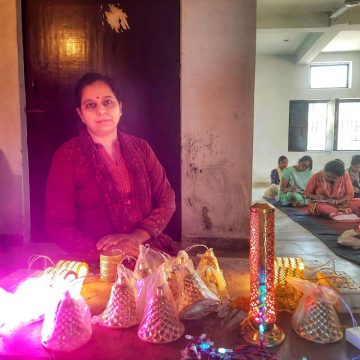
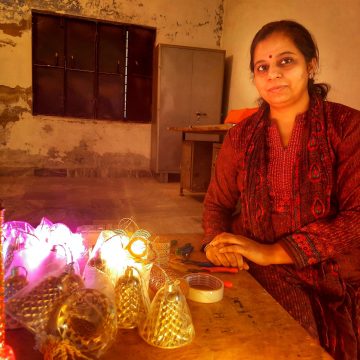
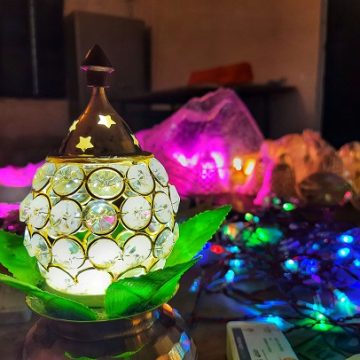
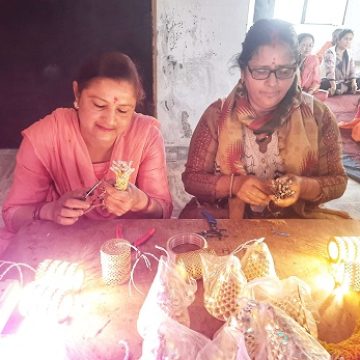
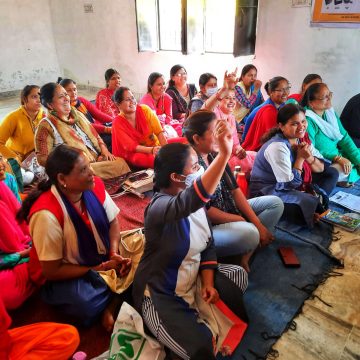
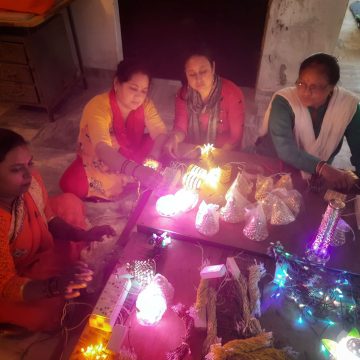
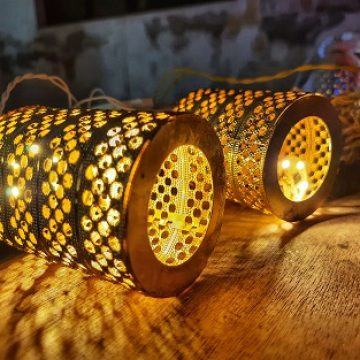
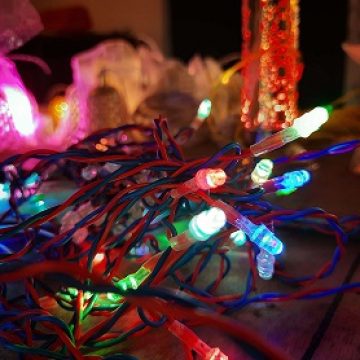
Dehradun: The hand that rocks the cradle, rules the world. In Haripur Kalan village of Doiwala block in Dehradun district, giving this adage a LED twist are these very hands that are out to rock the Chinese hegemony in the business of serial lights. Thanks to Kamalpreet Kaur and her motley crew of electrical entrepreneurs, this village in Uttarakhand is looking to regain its past glory in this business.
For Kaur (41), a homemaker for 15 years, the transition began in 2015-16 when she dreamt of becoming an entrepreneur. A graduate from DAV College in Dehradun, her transformation into a businesswoman has been electrifying, bringing women into a new stream of business which hitherto was limited to sewing, knitting, weaving, and preparing pickles and papads.
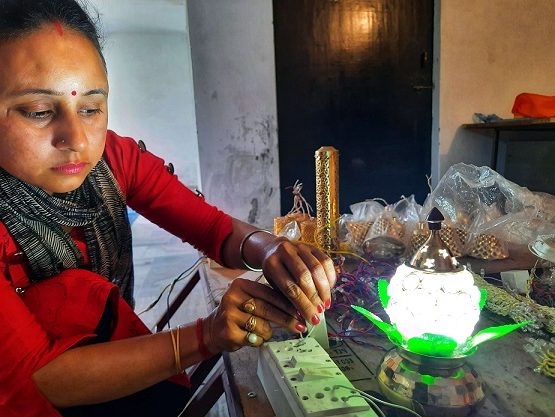
Seema Rayal a LED trainee under Kamalpreet Kaur (Picture Credit: Varsha Singh)
It was Kaur who introduced the terminology AC/DC, Volts, Amperes, and thrust pliers, cutters, and wires to the rural women who until then had never even dreamt of being part of an entrepreneurial setup.
While the initial reluctance to make this transition was evident, it was Kaur’s acumen in guiding these doubting minds in their abilities to shift to a new trade that did tilt the balance.
From sewing and knitting to plier and cutter
“Every woman manages the sewing-knitting-weaving and the pickle and papad routine. But this work is different. I rigged LED lights and serial light sets and bamboo lights for Diwali. Now we are looking forward to starting our brand. We needed a guide and we found this mentor,” said Bhavana Pandey who completed her two-month hands-on training in preparing LED lights in March 2021.
Bhavana was not the only one in this training. She was part of 30 other women in the 20 to 60-year age group whose education ranged from illiterate to BTech graduates. It was an unusual transition for hands used to rolling pins in the kitchen to hold cutting pliers, cutter, wire, and other electrical instruments. From the danger of burning their fingers while preparing Rotis to chances of getting electrocuted, this turnaround was total.
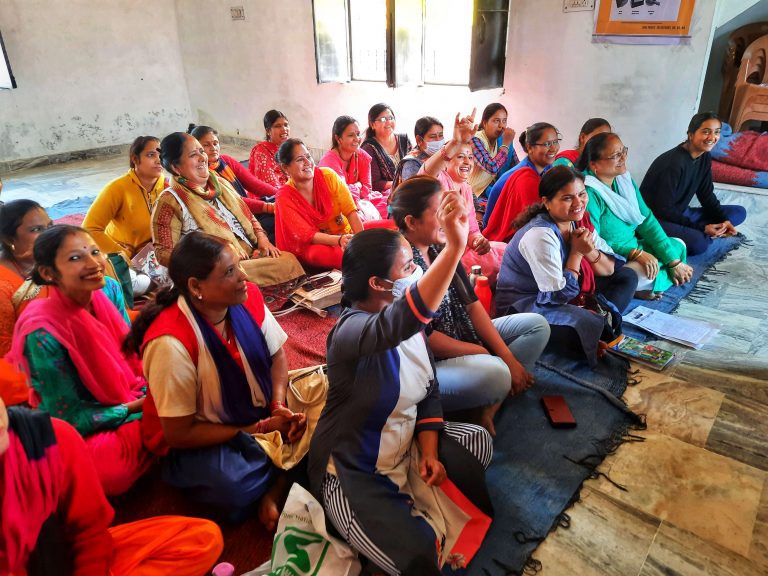
Women from Haripurkalan at an LED training camp in Dehradun (Picture credit: Varsha Singh)
Kaur’s influence on this village can be gauged from the fact that she has singularly brought more than 3,000 women into this business thus far.
Setting her off on this path was her move to apply for a loan under Pradhan Mantri Rozgar Srijan Yojana in 2016. “LEDs are not just bulbs, but an energy saver. I mooted my proposal with this thought. And the bank had its doubts on how a woman would manage this business,” she said.
Her riposte then was being a woman is my sole qualification. Kaur recalled, “I will ensure that there are so many women in line (seeking a loan for this business) that you (the bank) will feel this is an exclusive business for women, I told them more in jest. I guess the lord almighty heard me,” said Kaur who went on to become this hilly state’s first woman entrepreneur in the field of electrical engineering.
The launch pad
The next leg up came in 2016 when Saras Mela was organised at the parade ground in Dehradun where stalls by various government departments were set up. Kaur’s inquiry for setting up a stall drew a staid response in that one could put up stalls for eatables, handlooms, or handicrafts. “Since I had obtained a loan under PMEGP, I was allotted a table there,” she said. It was this table that turned her fortunes around.
A stall opposite the table allotted to Kaur showcased furniture that inmates of the jail had prepared. Even as she was wondering about the quality of the furniture, the jailor inquired if the prisoners could learn this trade of LED bulbs. Thus started a session of training the prisoners about preparing LED lights. Kaur not only supplied the raw materials but also ensured the lights prepared by them lit up the jail walls.
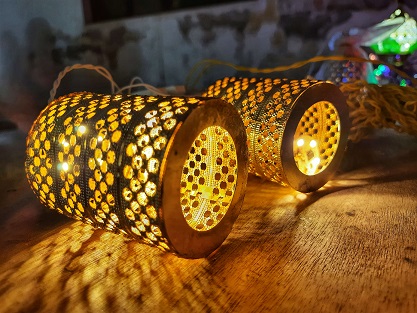
This success invariably drew the attention of other government departments. Institutions such as Khadi Gramodyog, the National Institute of Entrepreneurship and Small Business Development approached her to train their beneficiaries in this LED venture. During the same time, a move by Rajveer Singh — Kaur’s husband — to quit his job as an electrical engineer in far-off Mumbai and join her venture, gave the business a major push.
The duo then arranged training at Dehradun jail, Haridwar jail, Bareilly jail, Nari Niketan at Dehradun. “We also arranged for training for the villagers with the Wildlife Institute of India at Bijnor for the Namami Ganga project. This training was to wean them away from depending on the Ganga for their livelihood,” Kaur said.
She also tied up with other government agencies and women’s self-help groups to train women.
This venture soon turned into social service for by this time many villages in Dehradun had associated with the LED lights business. Women in blocks such as Vikas Nagar, Sahaspur, Kunja, Kalsi were doing this work. “We spoke to them technically on how to use the soldering pot, how to use AC-DC current.
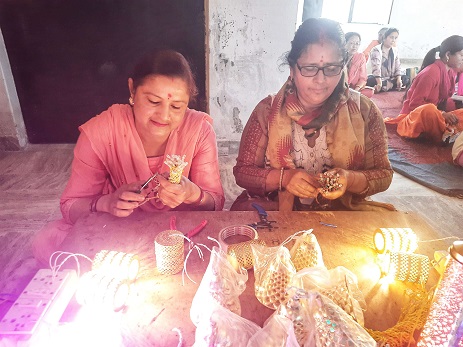
Tulsi Mehra (in pink) and Bhavana Pandey as LED trainees (Picture credit: Varsha Singh)
When they were perfect in soldering, we asked them to hone their skills soldering household items such as mixers,” she explained.
Such was the impact that women who hitherto were afraid of electricity had now turned into ‘electrical engineers’, Kaur said. Acknowledging her inspirational role, Rajveer said, “Earlier, there were no technological training programs and only traditional training courses for women were provided. Women part of her venture survived pointed jabs from their families and the result brought a smile even to their sceptical minds.”
Building a brand
Susheel Mohan Dobhal, District Development Officer, Dehradun said the department prepared a plan to set up a growth center at Thano village as part of the National Rural Livelihoods Mission. “We had to conceptualise a product that was locally available and also attracted the local womenfolk. When the idea of promoting the LED lights business was mooted, we onboarded Kaur as our official training partner,” he said.
Kaur’s training team that initiated the training trained 130 women for two months. The trainees were put through the paces of basic information to end-product assembly. An equal emphasis was laid on quality. Their entire work culture was very inspiring, Susheel Mohan said about the centre that started in December 2019. In 2020, serial lights prepared at this growth center adorned the government building during Diwali.
“The product is now being marketed under the Hilansh brand and we are planning to introduce it on a digital platform to ensure a better market reach for the product,” he added.
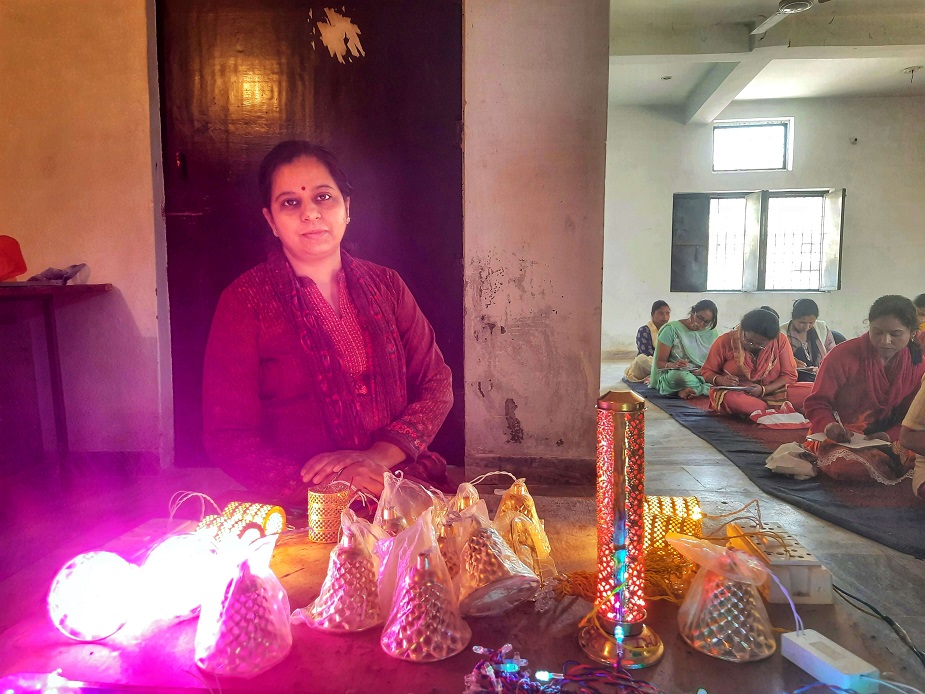
Kamalpreet Kaur at the end of her training session (Picture credit: Varsha Singh)
Admitting that companies such as Philips, SYSKA, Havells, are established in this business, Kaur said the hold of Chinese in this range of products in the Indian market is too strong to be discounted rather easily and the worry was how will the product manufactured by these women fare in front of such stiff competition. So we focused on decorative lights, LED ceiling lights where the competition is less and the market is big, she added.
What makes this transformation amidst this stiff competition in the LED lights business is also a strong desire to restore the former lost glory of Dehradun in this industry.
“Dehradun was once the biggest centre for miniature decorative lights and the bulbs prepared here were sold pan-India. But China overshadowed this based on their technique, design, and cost, and Made In China products became a household name in India,” she rued.
“It is my dream to restore this past glory of Dehradun,” Kaur said. The serial lights manufactured by women of Dehradun should not only light up our town but also the entire country, she added. “When I ventured into the LED light business, people had said ‘a lady can’t do this!’. But now when one speaks about LED lights, they speak about the rural women electrical engineers of Dehradun.”
